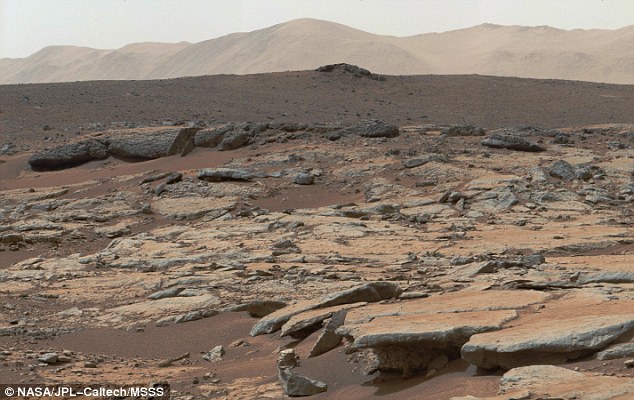The water on Mars story is getting interesting. Is this another example of water as part of planetary make-up (even perhaps subterrranean water) (see post yesterday on Primary Water). Some interesting information is being beamed back to earth from Curiosity Rover on Mars, as it probes and analyses rock samples on the red planet. It has found manganese oxide in Martian rocks and scientists say this suggests the planet once had higher levels of oxygen (in order to facilitate the process of oxidisation). It is being suggested that solar radiation may have split water molecules and therefore releasing oxygen into the air. However, oxygen may be a component of the inner Mars, together with hydrogen, therefore producing water molecules under the ground (going by what was said yesterday). The story of the mainstream view is at www.dailymail.co.uk/sciencetech/article-3663774/Ancient-Mars-like-Earth-…
 The presence of manganese oxides suggests the atmosphere once had higher levels of oxygen as well as liquid water on the surface. In order for the compounds to form they would have required an oxidising atmosphere – rich in oxygen. However, a surprising deduction is also made, and this is that the team believes that rather than being caused by microbes as on the Earth the atmospheric oxygen on Mars was the result of water molecules being split by solar radiation. So, we have a leap of imagination. Oxidisation on Earth is due to microbes in the geology – but on Mars that cannot be (and therefore the oxygen must have been in the atmosphere rather than in the rocks).
The presence of manganese oxides suggests the atmosphere once had higher levels of oxygen as well as liquid water on the surface. In order for the compounds to form they would have required an oxidising atmosphere – rich in oxygen. However, a surprising deduction is also made, and this is that the team believes that rather than being caused by microbes as on the Earth the atmospheric oxygen on Mars was the result of water molecules being split by solar radiation. So, we have a leap of imagination. Oxidisation on Earth is due to microbes in the geology – but on Mars that cannot be (and therefore the oxygen must have been in the atmosphere rather than in the rocks).
 It is estimated Mars once had enough water to cover the entire surface in a liquid layer 450 feet deep (or 137m). However, in practise it probably formed a sea that occupied a large portion of the northern hemisphere of Mars and could have been up to one mile deep. Almost 90 per cent of this water has been lost to space, it is further claimed. We might now wonder if that is true. Was it lost to space and is the geology of the northern hemisphere of Mars only comprehensible as an oceanic basin?
It is estimated Mars once had enough water to cover the entire surface in a liquid layer 450 feet deep (or 137m). However, in practise it probably formed a sea that occupied a large portion of the northern hemisphere of Mars and could have been up to one mile deep. Almost 90 per cent of this water has been lost to space, it is further claimed. We might now wonder if that is true. Was it lost to space and is the geology of the northern hemisphere of Mars only comprehensible as an oceanic basin?
